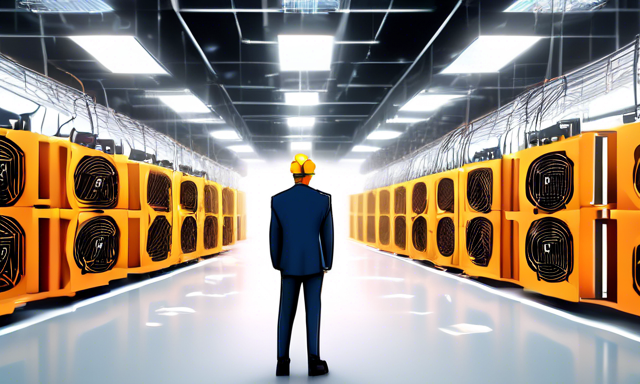Innovative Collaboration in Crypto: Renewable Energy Meets Bitcoin Mining 🌍💰
This year, Deutsche Telekom’s subsidiary, MMS, has entered into a unique collaboration with Bankhaus Metzler. Their goal is to test a new project that capitalizes on surplus renewable energy available in Germany. This initiative seeks to leverage excess energy generated from wind and solar sources to power Bitcoin mining operations, potentially serving as a tool for stabilizing the energy grid.
Harnessing Surplus Energy for Bitcoin Mining ⚡️
The project aims to utilize surplus energy that is often wasted due to limitations on the energy grid and the lack of energy storage solutions. The mining facilities will be set up at Riva GmbH Engineering’s location in Backnang, Germany. MMS will oversee the mining operations, while Bankhaus Metzler will assess the prospects for financial service applications tied to digital assets.
One of the key objectives of this project is to collect data and gain insights on effectively converting surplus energy into digital assets, a concept the team has termed “digital monetary photosynthesis.” This pilot project is anticipated to yield valuable information that might shape future Bitcoin mining practices concerning energy grid management.
Germany’s Renewable Energy Challenge 🏭
With the rise in renewable energy utilization, Germany faces challenges related to balancing its national energy grid owing to the variability of energy output based on weather conditions. The collaboration between Deutsche Telekom MMS and Bankhaus Metzler hopes to create a dependable mechanism for managing these fluctuations in energy availability.
Bitcoin mining has the unique ability to adjust its power consumption swiftly, which aligns perfectly with the needs for managing surplus energy during peak production periods. This method has already proven successful in other regions, including the United States and Finland, where Bitcoin mining is integrated into energy grid management practices.
The pilot will be supported by Metis Solutions GmbH, and mining containers will be established at Riva GmbH, which generates its own electricity via an on-site photovoltaic system. This arrangement looks to transform excess energy into digital currency while alleviating stress on Germany’s energy grid during peak production times.
Oliver Nyderle, who heads the Digital Trust and Web3 Infrastructure division at Deutsche Telekom MMS, highlighted the necessity for responsive mechanisms in today’s energy landscape. She stated, “For this, we need mechanisms that can respond quickly to changes and absorb fluctuations.”
Exploring Digital Asset Opportunities with Bankhaus Metzler 📈
Bankhaus Metzler, noted as Germany’s second-oldest bank, views this initiative as a move towards enhancing blockchain technology applications beyond conventional financial scenarios. Through this pilot, the bank aims to explore the potential for developing financial services based on digital assets such as Bitcoin.
Hendrik König, the Head of Digital Assets at Bankhaus Metzler, underscored the increasing significance of blockchain technology. He pointed out that their goal is to gain insights across various application domains to elevate the innovative potential of blockchain within Germany. He expressed, “Blockchain technology is gaining increasing importance in operational business outside the financial industry.”
Meanwhile, Riot Platforms, a notable cryptocurrency mining entity, disclosed impressive financial results with total revenues reaching $84.8 million, attributed to a significant increase in their hash rate, now at 28 EH/s. This increase allowed them to mine 1,104 Bitcoin during the third quarter of this year, despite the challenges caused by the recent Bitcoin halving.
However, the company also reported a net loss amounting to $154 million due to diminished power credits, heightened expenditures, and impacts stemming from the halving. Riot has managed to sustain its energy efficiency at a cost of 3.1 cents per kilowatt-hour, resulting in mining expenses that remain below current market prices, which contributes to the organization’s overall resilience.
While Bitcoin mining in some areas flourishes, countries like Russia appear to be taking a different direction entirely. Recent reports indicate that Russian efforts are focusing on alternative strategies that diverge from the current cryptocurrency mining trends.
Hot Take: The Future of Crypto and Renewable Energy 🔍
This year’s collaboration between Deutsche Telekom MMS and Bankhaus Metzler presents a forward-thinking approach to managing surplus energy through innovative Bitcoin mining. As industries continue exploring the potential of renewable resources, projects like this may pioneer new pathways for balancing energy grids while embracing digital currencies. The outcome of such initiatives could not only redefine how energy is utilized but also how the blockchain technology landscape evolves within traditional finance sectors and beyond.
Source:





 By
By

 By
By
 By
By

 By
By